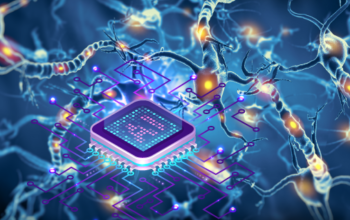
Date: 8th November 2021
Mental disorders are a leading source of medical economic burden, and existing therapies do not target the cause of these disorders: dysfunctional communication in brain circuits. Whilst electrical stimulation can modulate these circuits, results of clinical neurostimulation for mental disorders has been variable. Now, researchers demonstrate improved human brain function related to self-control and mental flexibility by merging artificial intelligence (AI) with targeted electrical brain stimulation offering a totally new approach in treating mental illness.
The lack of ability to withhold a default pre-potent response in favour of a more adaptive choice – for example a person with depression who just can’t get out of a ‘stuck’ negative thought - are common in in numerous mental disorders such as depression, anxiety, addiction, schizophrenia and obsessive-compulsive disorders, and are signs of deficits in cognitive control. The ability to flexibly alter strategies or response styles as goals change is impaired in most mental illnesses, and whilst deep brain stimulation (DBS) of the internal capsule and other selected regions of the brain have been shown to improve performance on cognitive control tasks, several barriers have prevented integration as a method of treatment.
Now researchers at the University of Minnesota Medical School and Massachusetts General Hospital, US, led by Alik Widge report a proof-of concept that specific human mental function linked to mental illness can be reliably enhanced using precisely targeted electrical stimulation, and that AI used as a controller could effectively predict when cognitive control was lacking and provided boost of stimulation significantly enhancing cognitive performance.
The team started a pilot study in humans with participants undergoing intracranial epilepsy monitoring where hundreds of tiny electrodes were placed throughout the brain to record its activity and identify where seizures originated. The participants performed cognitive tasks while undergoing electrode monitoring, and the team identified that electrical stimulation of the internal capsule of the brain across participants improved cognitive control and enhanced theta power – different conflict tasks evoke robust electrophysiological signatures such as theta oscillations. This was particularly noticeable on the dorsal sites of the internal capsule.
Having determined the best sites in the brain for electrical stimulation, the team then developed AI algorithms, so that after stimulation, they could track patients’ cognitive control abilities, both from their actions and directly from their brain activity. This controller method could ‘decode’ the brains activity, detecting when it was having difficulty with the task, and then provided boosts of stimulation. The team showed that closed-loop stimulation upon the detection of lapses produced larger behavioural changes than open-loop stimulation, and that task performance could be directly decoded from the activity of a small number of electrodes via neural features that were compatible with existing closed-loop brain implants. Overall, the closed-loop AI algorithm used as a controller was twice as effective at improving cognitive function than stimulating at random times.
The team also noted that some patients had significant anxiety in addition to their epilepsy. These participant found that the cognitive-enhancing stimulation improved their anxiety, reporting that they were more able to shift their thoughts away from their distress and focus on what they wanted, suggesting this method could be used to treat patients with severe and medication-resistant anxiety, depression or other disorders.
Conclusions and future applications
The study here is the first to show that a specific human mental function linked to mental illness can be reliably enhanced using precisely targeted electrical stimulation. They found that specific sub-parts of the internal capsule such as the dorsal sites are particularly amenable to effective cognitive enhancement. Furthermore, by using closed-looped AI algorithms as a controller they could significantly increase effectiveness of the treatment.
Looking to the future the team are preparing for clinical trials. This translation to the clinical could potential be rapid as deep brain stimulation for improving cognitive control is already approve for use in human by the Food and Drug Adminstration (FDA).
Deep brain stimulation has also been investigated for other neurological disorders such as Parkinson’s disease but as seen here requires invasive surgical device implantations. However, researchers have recently developed a new brain stimulation technique called sonothermogenetics – a noninvasive technology that uses focused ultrasound to stimulate cell-type-specific activation of neurons and evokes behavioural responses in vivo, and which was able to robustly control behaviour. Whilst sonothermogenetics has yet to be tested in humans, and its translation is likely to take far longer that the AI controller system here, its non-invasive nature is certainly compelling.
The work reported here is an important milestone in using deep brain stimulation to treat mental disorders and will add to the knowledge of other data such as a recent study using machine learning to predict how patients respond to deep brain stimulation. There a machine learning algorithm analysed the brain data and predicted outcomes of stimulation creating a personalised brain map of patients. Both of these works represent a major step forward in achieving new therapies for a host of disorders including mental and neurological. Widge and his colleagues envisage this as a totally new approach in treating mental illness – moving away from suppressing symptoms and giving patients a tool to take back control of their own minds.
For more information please see the press release at the University of Minnesota
Basu, I., Yousefi, A., Crocker, B., Zelmann, R., Paulk, A.C., Peled, N., Ellard, K.K., Weisholtz, D.S., Cosgrove, G.R., Deckersbach, T., et al. (2021). Closed-loop enhancement and neural decoding of cognitive control in humans. Nature Biomedical Engineering.
https://doi.org/10.1038/s41551-021-00804-y
